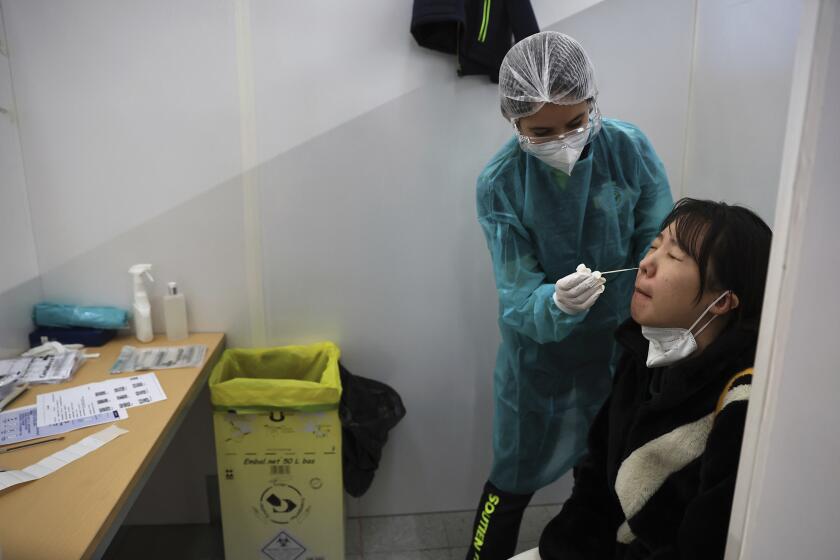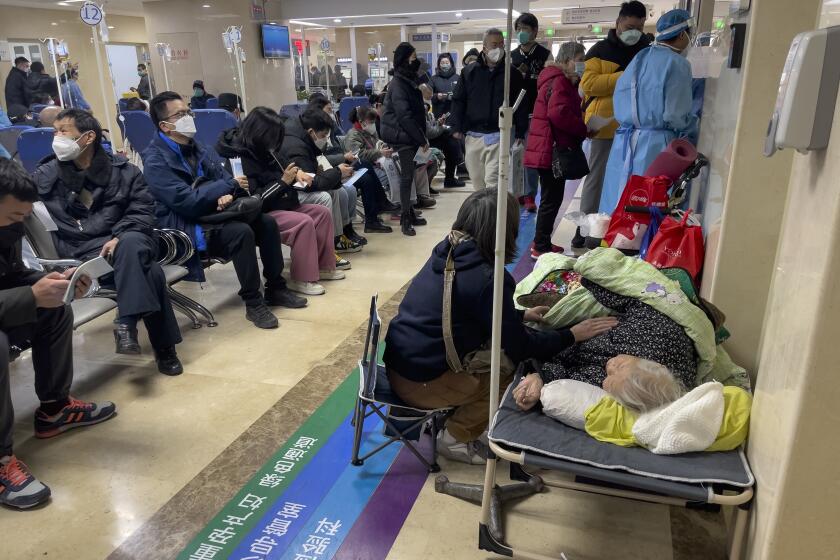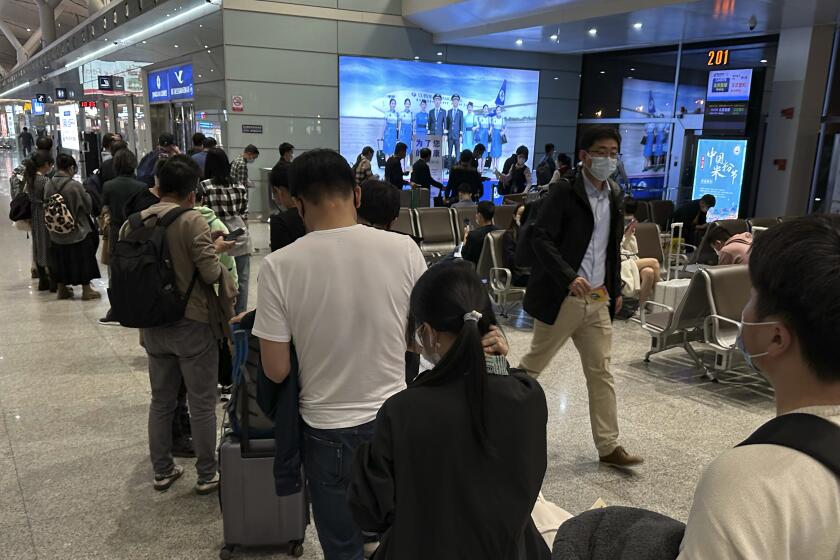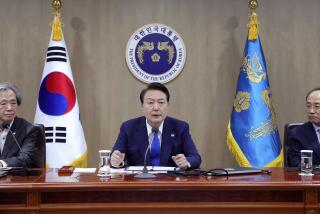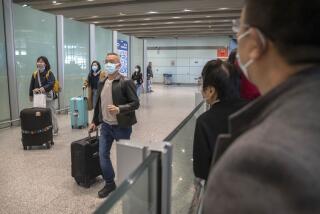Beijing suspends visas for South Korean, Japanese visitors after travel restrictions
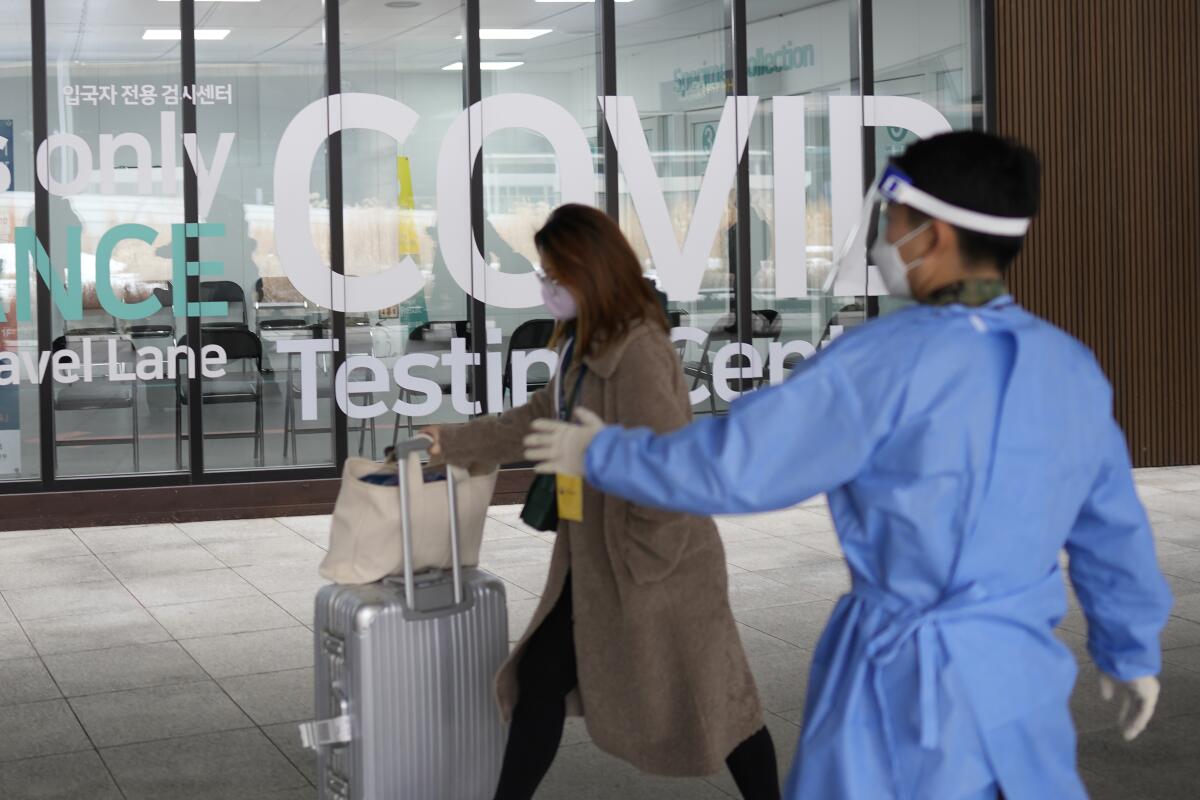
- Share via
BEIJING — Chinese embassies suspended issuing new visas for South Korean and Japanese people on Tuesday in apparent retaliation for COVID-19 testing requirements recently imposed by those countries on travelers from China.
The embassies in Tokyo and Seoul announced the suspensions in brief online notices.
The Chinese Embassy in Seoul, in a brief notice on its WeChat social media account, said the ban would continue until South Korea lifts its “discriminatory entry measures” against China. The announcement covered tourist, business and some other visas.
China’s Foreign Ministry had threatened countermeasures last week against countries that announced new coronavirus testing requirements for travelers from China. At least 10 nations in Europe, North America and Asia have done so recently, with officials expressing concern about a lack of information about rapidly spreading outbreaks in China.
It wasn’t clear why South Korea and Japan were targeted or whether the suspensions would be expanded to other countries that have imposed coronavirus testing on passengers from China.
The Chinese Embassy in Tokyo said only that it had stopped issuing visas. The announcements appeared to apply only to new applicants, with nothing mentioned about people currently holding visas.
South Korea’s Foreign Ministry said in a statement that “our government’s step to strengthen anti-virus measures on passengers arriving from China is based on scientific and objective evidence. We have provided information to the international community in a transparent manner and we have communicated with the Chinese side in advance.”
The European Union and China are moving closer to a political standoff over the COVID-19 crisis. An EU offer of help, including vaccine donations, was also as good as slapped down.
A Japanese Foreign Ministry official said earlier that it would be “regrettable” if restrictions were imposed. The official spoke on customary condition of anonymity.
A withholding of visas from South Korean or Japanese businesspeople could delay a hoped-for revival of commercial activity and potential new investment following China’s abrupt lifting of coronavirus controls last month.
Business groups had warned earlier that global companies were shifting investment plans away from China because it was too hard for foreign executives to visit under pandemic controls. A handful of foreign auto and other executives have visited China over the last three years, but many companies have relied on Chinese employees or managers already in the country to run their operations.
A South Korean restaurant owner in Beijing said the announcement forced friends to postpone plans to visit China. He spoke on condition of anonymity out of concern that his business might be affected. He added that he is preparing to renew his Chinese work visa and doesn’t know whether that will be affected.
In a phone call Monday before the visa suspension was announced, Chinese Foreign Minister Qin Gang “expressed concern” to his counterpart in Seoul about the measures taken by South Korea. Qin said he “hopes that the South Korean side will uphold an objective and scientific attitude.”
Patients, most of them elderly, lie on stretchers in hospital hallways or take oxygen while sitting in wheelchairs as COVID-19 cases surge in Beijing.
China’s move appeared to be grounded on its stiff demand for reciprocity in foreign relations. About a dozen countries have followed the U.S. in requiring a negative test result before departing China, a coronavirus test upon arrival at the airport, or both.
“Regrettably, a handful of countries, in disregard of science and facts and the reality at home, have insisted on taking discriminatory entry-restriction measures targeting China,” Foreign Ministry spokesperson Wang Wenbin said Tuesday. “China firmly rejected this and took reciprocal measures.”
He did not respond directly to questions about the suspension of visas for South Korean and Japanese people.
The World Health Organization and several nations have accused China of withholding data on its outbreak. A WHO official said Tuesday that the agency sees no immediate threat for the European region from China’s outbreak, but that more information is needed.
China says it will resume issuing passports for tourism in another big step away from anti-virus controls that isolated the country for almost three years.
China’s ambassador to Australia said the response of those nations to China’s COVID-19 outbreak hadn’t been proportionate or constructive.
Xiao Qian told reporters in Canberra that China had shifted its strategy late last year from preventing infections to preventing severe cases. He said countries should use a science-based response.
“Entry restrictions, if they’re targeted at China, they’re unnecessary,” the ambassador told reporters.
The online notice from the Chinese Embassy in Seoul did not say why China singled out South Korea for retaliation, although Chinese President Xi Jinping’s government has long resented Seoul’s alliance with Washington.
Breaking News
Get breaking news, investigations, analysis and more signature journalism from the Los Angeles Times in your inbox.
You may occasionally receive promotional content from the Los Angeles Times.
Once-cordial ties between South Korea and its biggest trading partner soured after China targeted businesses, sports teams and even K-pop groups to protest deployment of an advanced U.S. anti-missile system in South Korea. China fought on the side of North Korea in the 1950-1953 war and has remained a staunch supporter of Pyongyang amid its missile launches and nuclear tests, opposing further sanctions against Kim Jong Un’s government.
China abruptly reversed its strict pandemic containment requirements last month in response to what it says was the changing nature of the outbreak. That came after three years of lockdowns, quarantines and mass testing that prompted rare politically tinged protests in Beijing and other major cities.
The most optimistic forecasts say China’s business and consumer activity might revive as early as the first quarter of this year. But before that happens, entrepreneurs and families face a painful squeeze from a surge in coronavirus cases that has left employers without enough healthy workers and kept wary customers away from shopping malls, restaurants, hair salons and gyms.
The abrupt decision by Xi’s government to end controls that shut down factories and kept millions of people at home will move up the timeline for economic recovery, but might disrupt activity this year as businesses scramble to adapt, forecasters say.
China is now facing a surge in cases and hospitalizations in major cities and is bracing for a further spread into less developed areas with the start of the Lunar New Year travel rush, set to get underway in coming days. While international flights are still reduced, authorities say they expect that domestic rail and air journeys will be double that over the same period last year.
More to Read
Sign up for Essential California
The most important California stories and recommendations in your inbox every morning.
You may occasionally receive promotional content from the Los Angeles Times.
